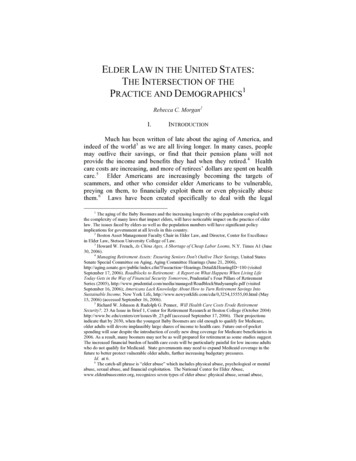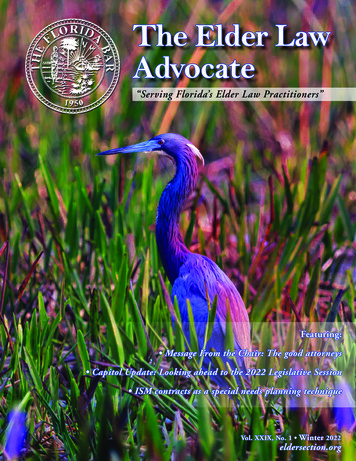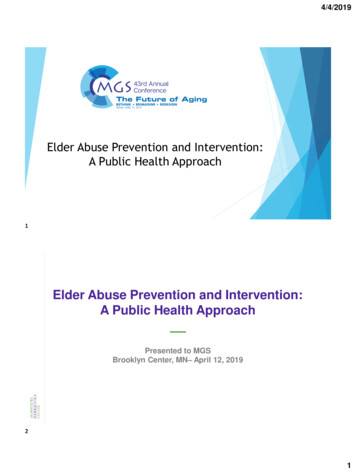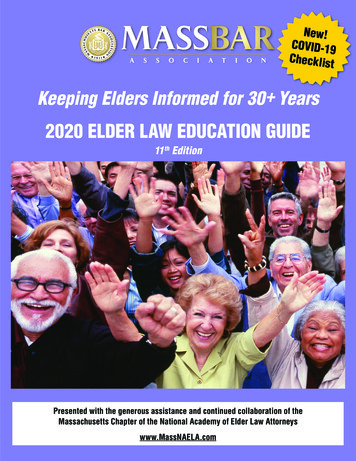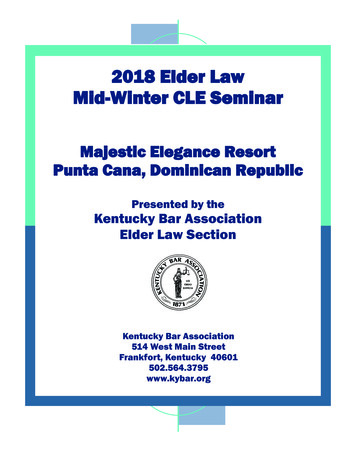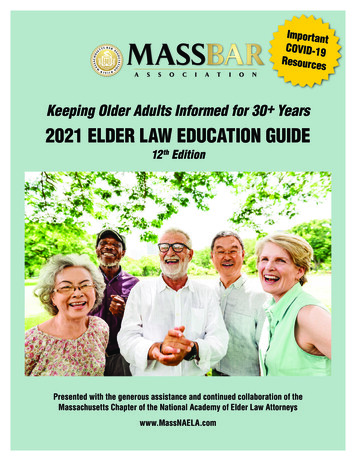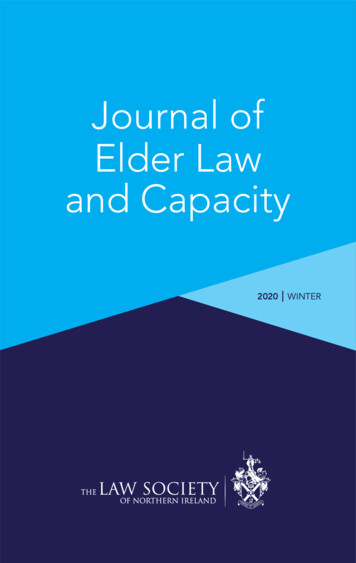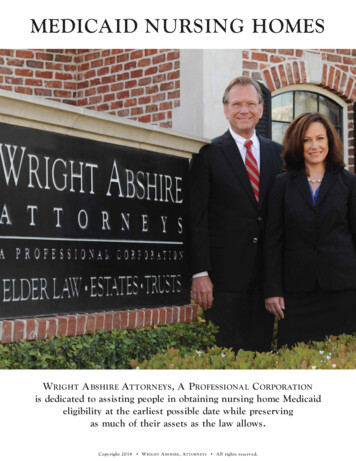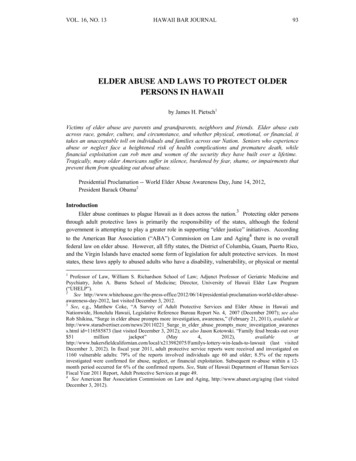
Transcription
The Delaware CountyELDER LAW HANDBOOK& RESOURCE GUIDEFor Seniors and Their Families in Delaware County, PennsylvaniaPUBLISHED BYDelaware County Bar Association – Elder Law CommitteeANDDelaware County Office of Services for the Aging (COSA)2015 EDITION
Copyright Notice: Each article in this Handbook is the property of its author(s) and may not be published orcopied without the authors’ permission. All rights are reserved.Disclaimer: The materials presented in this handbook have been prepared for informational purposes only andare not offered for and do not constitute legal advice or legal opinion on any specific fact or issue. Access tothese materials or any information therein is not intended to create an attorney-client relationship with anyperson associated with the Delaware County Bar Association and/or any contributor to this publication.
Delaware County Office of Services for the Aging (COSA)206 Eddystone Avenue, 2nd Floor, Eddystone, PA 19022-1594Telephone: 610-490-1300 or 1-800-416-4504 Fax: 610-490-1500Website: www.delcosa.org Denise V. Stewart, DirectorDelaware County Council, 2015Mario J. Civera, Jr., ChairmanColleen P. Morrone, Vice ChairmanJohn P. McBlain David J. White Michael CulpMarianne Grace, Executive DirectorTelephone: 610-891-4000 Website: www.co.delaware.pa.usDelaware County Register of Wills and Clerk of Orphans’ Court201 W. Front Street, Media, PA 19063Telephone: 610-891-4407 Website: www.co.delaware.pa.us/registerofwillsJennifer Holsten Maddaloni, EsquireDelaware County Bar Association335 W. Front Street, P.O. Box 466, Media, PA 19063Telephone: 610-566-6625 Fax: 610-566-7952 Website: www.delcobar.orgKristen M. Rushing, Esquire, 2015 PresidentWilliam L. Baldwin, Esquire, Executive DirectorDelaware County Bar Association, Elder Law Committee2004–2014 Co-Chairs: Dana McBride Breslin, Esquire, & Linda M. Anderson, Esquire2015 Co-Chairs: Linda M. Anderson, Esquire, & Elizabeth T. Stefanide, EsquireElder Law Handbook CommitteeEditorsHarris J. Resnick, Esquire Cynthia A. McNicholas, EsquireContributors and VolunteersThomas M. Lilly, JD, CLUJanet M. Lis, EsquireRobert M. Lodge, EsquireHelen Lynn, RN, BSNJennifer Holsten Maddaloni, Esquire,Delaware County Register of Willsand Clerk of Orphans’ CourtDionysios C. Pappas, EsquirePhillip B. Rosenthal, EsquireHonorable Anthony D. ScanlonBarry W. VanRensler, EsquireJohn J. Whelan, Delaware CountyDistrict AttorneyJoshua R. Wilkins, EsquireR. Scott Aldridge, EsquireLinda M. Anderson, Esquire, CELATimothy A. Berger, EsquireDana McBride Breslin, Esquire, CELARobert J. Breslin, EsquireRobert R. DeLong, Jr., EsquireRobert B. Famiglio, EsquireThomas W. Flynn, EsquireF. D. Hennessy, Jr., EsquireTracy HornigMary K. Kennedy, EsquireJeff L. Lewin, EsquireJoseph P. Lesniak, EsquirePenn DOT Driver’s License Center, Granite RunBryn Mawr Rehab Hospital, Driver Rehabilitation ProgramHerb Denenberg, J.D., LL.M., Ph.D., CPCU, CLU (1930–2010)i
Acknowledgments –Sixth EditionMention must be made of Dana M. Breslin,Esquire, who also stepped up in recentweeks to perform editing duties. Dana hasserved as Co-Chair (with Linda Anderson) ofthe Elder Law Committee of the DelawareCounty Bar Association since its formationin 2004. Dana and Linda recognized thatElder Law had become a distinct and specialized field of law encompassing theneeds of senior citizens, and focused notonly on Medicaid planning but also estateplanning and other work with clients withdiminished capacity, real estate and consumer issues, guardianships, Medicare issues, and planning with Veterans’ benefits,among other things. Dana and Linda persuaded the Bar Association that a separateElder Law Committee was warranted. Aftermany years serving as Co-Chair of the ElderLaw Committee, Dana stepped down in December 2014. But she is as active and involved as ever in her practice and her otherprofessional activities. In addition to herwork on this Handbook, she continues toorganize many CLE seminars, including thepopular “Breakfast with President JudgeKenney” series. We’re grateful for her leadership, her generosity in sharing her vastknowledge, and her support of the profession.Since its inception in 2003, the Handbookhas been a joint effort of the DelawareCounty Bar Association (in particular theElder Law Committee), and the DelawareCounty Office of Services for the Aging(COSA). Contributions have taken the formof many unpaid hours performing the workof researching, writing, reviewing, updating,editing, proofreading, word processing, publishing, distribution as well as, of course,monetary contributions. Once again, we arevery grateful to our donors, whose donationshave allowed us to publish another printversion of this Handbook, and provide it tothe public free of charge, without relyingon paid advertising within the book. Thepublication costs of the 2015 Edition ofthe Handbook were underwritten by thefollowing:Delaware County Office ofServices for the Aging (COSA)George B. Lindsay FoundationE. Wallace Chadwick Memorial FundDelaware County Bar Foundationby a grant from the Eleanor J. RothCharitable TrustA sincere word of thanks also is due to theExecutive Director of our Delaware CountyBar Association, William L. Baldwin, Esquire. We are truly grateful for Bill’s friendship and constant support, particularly inthe area of fundraising, where his effortswere key to the securing of much-neededdollars. Bill also gave us permission to usethe impressive photograph (taken by BettyAnn Flynn) of the Delaware County CourtHouse that graces the cover of this Editionof the Handbook.Delaware County Register of WillsThe attorneys and other knowledgeablepeople who contributed to the material presented in this Handbook are listed on pagei, and information concerning each suchcontributor appears in chapter 38. Thisbook truly is a community effort!In addition to those who wrote or updatedthe various chapters, the editors wish tothank those who stepped up in recent weeksto assist with editing tasks, including LindaAnderson, Esquire, and her associate,Joshua Wilkins, Esquire.ii
Editors’ Notes –Sixth Editionour chapter on Reverse Mortgages has beenrevamped by Robert J. Breslin, Jr., Esquire.Whether you are considering a reverse mortgage, or you or a parent are already boundby one, it’s so important to get the factsfrom an unbiased source, in order to understand the advantages and disadvantages, aswell as the alternatives, to a reverse mortgage. We’ve made this information easier tofind in our book by giving the material itsown chapter. See chapter 24.With each new Edition of the Elder LawHandbook and Resource Guide, we strive toimprove the content, its presentation andclarity. We also try to ensure that the mostrelevant and current information is provided. And, we try to be sure that you canfind answers to your questions easily whenneeded. With this Edition, we feel we’vemade improvements in all those areas.In previous Editions, we had included atelephone directory of various services and asenior citizen transportation directory. Whilethese were useful, we found in practice thatthe contact information changed too often,so that the information was largely unreliable a year after the Edition went to print.The most current contact information forvarious services, as well as senior citizentransportation options, is still available fromCOSA by calling 610-490-1300. And contact information for various agencies andprograms does appear within the variouschapters of the book.Included in this Edition is a brand newchapter describing Delaware County’s new,supervised Treatment Court Programs. Withits Veterans Court, Mental Health Court andDrug Treatment Court, Delaware County’scriminal justice system is attempting to respond to certain defendants whose specialcircumstances may have led to criminal behavior, and to protect the community’s welfare by preventing future criminal activity.See chapter 30.A new Power of Attorney statute was signedinto law on July 2, 2014. The new lawmade extensive changes and, it’s fair to say,has changed our approach to integratingPowers of Attorney into the estate planningprocess. Your estate planning attorney willbe spending more time discussing yourDurable Power of Attorney than ever before,and you should come away with a good understanding of the powers that you aregranting to your agent and have every opportunity to place any appropriate limits onthose powers. The changes that were instituted should reduce the risk of abuse of thepowers granted in a Power of Attorney. Inresponse to the new law, we have a completely revised chapter on Powers of Attorney, courtesy of Dana M. Breslin, Esquire.See chapter 7.Each year (or in some cases twice a year)various government agencies set new benefit, eligibility and other figures, and wehave included this information, updatedas needed, with the Elder Law Handbookmaterial appearing on the websites of theDelaware County Bar Association (www.delcobar.org) and COSA (www.delcosa.org).For the first time, we are publishing themost recent numbers in the print versionof the Handbook. Updated information willstill be available online. The figures relateto Medicaid eligibility, SSI benefits, Medicare deductibles, co-pays, premiums andcoverage, and exemptions/exclusions forFederal Estate and Gift Tax purposes. Seechapter 16.New regulations affecting Reverse Mortgages were issued September, 2013, andOverall, the reader should be aware that thematerial in this Handbook was accurateiii
when written but that laws, regulations andpolicies can change at any time, and therefore, one should check the Bar Associationand COSA websites as well as the variousgovernment websites, call the appropriateagency, and/or consult with a qualified attorney or other expert when necessary, to verifythat the information being relied upon isstill accurate.This year, as we go to print, many changesare being made within Pennsylvania stategovernment, and websites and telephonenumbers change rapidly. For that reason,the information provided with regard tosome topics is general in nature, and youmay search the websites of the variousagencies involved for the most currentdetails.As mentioned in the Acknowledgments, thefield of Elder Law has become a distinctand specialized field in recent years, butmany of the issues dealt with by “elder lawattorneys” are also dealt with by attorneyswho do not have “elder law” as their primary focus. And so, this Handbook is alsoused as a go-to reference for attorneys whoneed an overview of a particular benefit,program or topic, in order to advise or directa particular client. In that way, the public isbetter served as well.iv
Table of Contents1Elder Law .1Attorney-Client Relations .1Pennsylvania Lawyers Fund for Client Security .1Choosing an Elder Law Attorney .12Older Americans Act .2County Office of Services for the Aging (“COSA”) .2COSA Services .3Community-Based Long-Term Care Services.3Resources.33Income Tax & Financial Planning .4Income Taxes and Planning .4Tax Preparation .4Standard Deduction at Age 65 .4Income Tax Credit Age 65 or Older .5Medical Expense Deductions .5Sale of Residence: Exclusion of Gain from Income .6Sale of Assets: Special Rules for Beneficiary of Inherited Property,and Surviving Joint Owners of Property and Spouses .6Estimated Tax Payments .64Estate Planning .7What is Estate Planning? .7Do I Need a Will? .7Non-Probate Property .8Joint Property .8Trusts.9Supplemental Needs or Special Needs Trusts.9Testamentary Trusts.10Living Trusts .10Irrevocable Living Trusts .10Revocable Living Trusts .10Table of Contentsv
Transferring Property from an Estate or Trust .12Inheritance, Estate and Gift Taxes.12Pennsylvania Inheritance Tax .12Federal Estate Tax .12Pennsylvania Estate Tax .13Federal Gift Tax.13Planning for Gifts .13Planning for Incapacity .14Preparing to Meet with Your Attorney .14Protecting Your Will .15Updating Your Will and Estate Plan.155When a Loved One Dies: Priority List .166Health Insurance Portability & Accountability Act (HIPAA) .187Power of Attorney (POA).188Durable Health Care Power of Attorney .209Living Wills.21Absence of a Living Will.2210Out-of-Hospital, Do Not Resuscitate (DNR) Orders .2211Guardianships .23Hearing Before the Court .23Powers and Duties.2412Social Security .25Contacting Social Security .25Retirement Benefits .25Retirement Benefits for Spouse .26Retirement Benefits for a Divorced Spouse .27Retirement Benefits for Divorced Widow(er)s .27Disability Benefits – SSD and SSI.27Applying for Benefits; Denials; SSA Records .2813Medicare .29Part A – Hospital Insurance .29Part B – Medical Insurance .29Cost of Treatment .29Appeals in Denials of Benefits .30Program Changes .31Supplemental Health Insurance for Traditional Medicare.31Medicare Advantage Plans .31Table of Contentsvi
14Medicare Prescription Drug Benefit/PACE & PACENET/Other Sources of Help for Prescription Medications .32The Medicare Prescription Drug Benefit – Medicare Part D .32Sources of Information .34PACE and PACENET (Pharmaceutical Assistance Contract for the Elderly) .35Veterans Benefits .36Pharmaceutical Company Programs .36Ways to Hold Down Drug Costs .3615Medicaid .37Eligibility for Nursing Home Benefits .37Estate Recovery .3916January, 2015 Figures for Governmental Programs& Other Matters .4017Low Cost Legal Services for Seniors.4118Public Benefits for Non-Citizens .4119Food Stamps (SNAP) .4120Veterans’ Benefits & Contact Directory.42General Eligibility .42Veterans’ Health Care Benefits .42VA Medical Programs.43Disability Compensation (Veterans with Service-Connected Disability) .45VA Pension .45Burial and Memorial Benefits .46Benefits for Dependents and Survivors .48Appeals of VA Claims Decisions .48Military Medals and Records .49Veterans’ Benefits Contact Directory .5021Long-Term Care Facilities .51Nursing Homes .51Nursing Home Residents’ Rights .51Assisted Living Facilities and Personal Care Boarding Homes .52Contract Questions .53Assisted Living Facilities/Personal Care Homes: Residents’ Rights .53Continuing Care Retirement Communities (CCRC) .54Long Term Care Facilities Licenses: Problems, Sanctions and Revocations .56Other Resources .5722Long Term Care Insurance.57Basic Long Term Care Insurance Decisions .57The Pennsylvania Partnership Program .60Table of Contentsvii
23Housing & Energy Assistance & Resources.60Low Income Home Energy Assistance Program (LIHEAP) .60Delaware County Weatherization Program .61Homeownership First Program .61Pennsylvania Housing Finance Agency (PHFA) Programs.61Keystone Renovate and Repair Program.61Access Modification Program .62Homeowners Energy Efficiency Loan Program (HEELP).62Don’t Borrow Trouble Helpline .62Housing Counseling for Developmentally Disabled Persons .62Fair Housing Education .6224Reverse Mortgages .6225Property Tax & Tax Rebates .6426Family Law .65Protection from Abuse – Personal and Financial .65Marriage.65Marriage – Rights and Responsibilities .66Planning for Subsequent Marriages .66Grandparents’ and Great-Grandparents’ Custody Rights .67Physical Abuse Protection From Abuse Orders (PFAs) .6927Elder Abuse & Neglect .70In an Emergency, Call 911.70Physical Abuse .70Emotional/Psychological Abuse.71Sexual Abuse .71Financial Abuse or Exploitation .71Neglect .72Protection From Abuse Orders (PFAs) .7228Senior Victim Services .7329Delaware County Criminal Investigation Division (CID)Senior Exploitation Unit .7430Treatment Court Programs .75Drug Treatment Court .75Mental Health Court .75Veterans Court .76For More Information on Treatment Court Programs .7631Consumer Protection .76Herb’s Rules for Rip-Off Avoidance .76Table of Contentsviii
Medicare Benefit Scam .77Other Scams.78Specific Scans Prohibited by Pennsylvania’s Consumer Protection Law .79It’s Probably a Scam and Often Most Certainly Is a Scam If.80Suggestions for Getting Action on Compliants .80Charitable Organizations .81Telemarketing .82Do Not Call Registry .82Stop Pre Approved Credit Card and Insurance Offers .83Stop Unwanted Mail Solicitations .84Predatory Lending: Loan Fraud .84A Note on Payday and Car Title Loans .85Credit Cards and Credit Card Bills.86Identity Theft .8632Landlord-Tenant .8833Small Claims Courts .9034Mediation Services .9135Driver’s Licenses; Driving Safely .9236Photo ID Cards .9437Handicapped Parking .9438Contributors .96Table of Contentsix
1fering agendas. Therefore, if two (2) peoplecome into an attorney’s office together, theattorney must make a clear determinationabout who will be represented. This helpsto protect vulnerable seniors when others tryto exert undue influence, to coerce or to usethreats to push seniors to execute powersof attorney or convey property against theirwill. Also stated in the rules: Pennsylvaniaattorneys are required to keep client information confidential.CHAPTERElder LawElder Law is the term used by the legal profession to focus on the special legal rightsand problems of senior citizens and disabled individuals. Attorneys who work inthis field need to master an ever-changingbody of law, legislation and regulationswhich deal with financial planning, healthcare and housing as well as discrimination,abuse and consumer fraud. Such a challenge usually requires training and experience in this special area of the law.Rule 1.14 explains that lawyers assume thattheir clients are competent and can understand what is happening. If the attorney“reasonably believes” that the client cannotact in his or her own self-interest, the attorney can seek a guardian or take other protective action.Attorney-Client RelationsA big question in elder law is: “Who is theclient?” Attorneys fairly often find that achild brings in a parent to the attorney’soffice. That child and parent may havediffering interests. Also, some older peoplehave physical or mental disabilities, whichmay limit their capacity to make proper decisions. Fortunately, attorneys have ethicalrules, known as Rules of Professional Conduct, which help to clarify these situations.Pennsylvania Lawyers FundFor Client SecurityAlthough the percentage of lawyers involvedin fraud and theft is extremely low, the newsof attorney misconduct is often given wideplay in the media. The fact is that lawyersare often put in positions of trust and temptation, yet it very rarely results in a financialloss to a client. In such cases, the Pennsylvania Lawyers Fund for Client Security canhelp to recoup some or all of the losses.Claims are submitted on pre-printed formsfrom the Supreme Court of Pennsylvania,Pennsylvania Lawyers Fund for Client Security, Pennsylvania Judicial Center, 601 Commonwealth Avenue, Suite 5400, Harrisburg,PA 17120; telephone 717-231-9510.According to Rule 1.5, all fee agreementsmust be in writing. This avoids disputesabout what the attorney is to do and howmuch these professional services will cost.If a fee dispute arises with a DelawareCounty attorney,
Delaware County Office of Services for the Aging (COSA) 206 Eddystone Avenue, 2nd Floor, Eddystone, PA 19022-1594 Telephone: 610-490-1300 or 1-800-416-4504 Fax: 610-490-1500 Website: www.delcosa.org Denise V. Stewart, Director Delaware County Council, 2015


